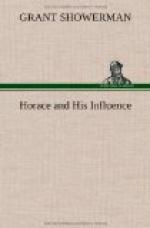iii. THE INTERPRETER OF ROMAN RELIGION
Still farther, Horace is an eloquent interpreter of the religion of the countryside. He knows, of course, the gods of Greece and the East,—Venus of Cythera and Paphos, of Eryx and Cnidus, Mercury, deity of gain and benefactor of men, Diana, Lady of the mountain and the glade, Delian Apollo, who bathes his unbound locks in the pure waters of Castalia, and Juno, sister and consort of fulminating Jove. He is impressed by the glittering pomp of religious processions winding their way to the summit of the Capitol. In all this, and even in the emperor-worship, now in its first stages at Rome and more political than religious, he acquiesces, though he may himself be a sparing frequenter of the abodes of worship. For him, as for Cicero, religion is one of the social and civic proprieties, a necessary part of the national mechanism.
But the great Olympic deities do not really stir Horace’s enthusiasm, or even evoke his warm sympathy. The only Ode in which he prays to one of them with really fervent heart stands alone among all the odes to the national gods. He petitions the great deity of healing and poetry for what we know is most precious to him:
“W_hen, kneeling at Apollo’s
shrine_,
T_he bard from silver goblet
pours_
L_ibations due of votive wine_,
W_hat seeks he, what implores_?
“N_ot harvests from Sardinia’s
shore_;
N_ot grateful herds that crop
the lea_
I_n hot Calabria; not a store_
O_f gold, and ivory_;
“N_ot those fair lands where slow
and deep_
T_hro’ meadows rich
and pastures gay_
T_hy silent waters, Liris, creep_,
E_ating the marge away_.
“L_et him to whom the gods award_
C_alenian vineyards prune
the vine_;
T_he merchant sell his balms and nard_,
A_nd drain the precious wine_
“F_rom cups of gold—to
Fortune dear_
B_ecause his laden argosy_
C_rosses, unshattered, thrice a year_
T_he storm-vexed Midland sea_.
“R_ipe berries from the olive bough_,
M_allows and endives, be my
fare_.
S_on of Latona, hear my vow!_
A_pollo, grant my prayer!_
“H_ealth to enjoy the blessings
sent_
F_rom heaven; a mind unclouded,
strong_;
A_ cheerful heart; a wise content_;
A_n honored age; and song_.”
This is not the prayer of the city-bred formalist. It reflects the heart of humble breeding and sympathies. For the faith which really sets the poet aglow we must go into the fields and hamlets of Italy, among the householders who were the descendants of the long line of Italian forefathers that had worshiped from time immemorial the same gods at the same altars in the same way. They were not the gods of yesterday, imported from Greece and Egypt, and splendid with display, but the simple gods of farm and fold native to the soil of Italy. Whatever his conception of the logic of it all, Horace felt a powerful appeal as he contemplated the picturesqueness of the worship and the simplicity of the worshiper, and reflected upon its genuineness and purity as contrasted with what his worldly wisdom told him of the heart of the urban worshiper.




